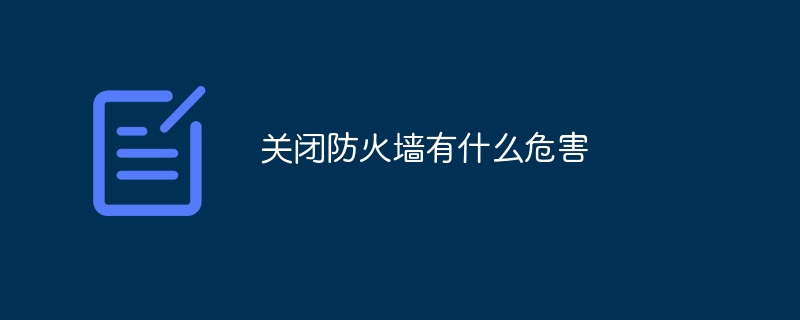
Turning off firewalls can make computers and networks vulnerable to malicious attacks, cause computers to be infected with malware, cause data leakage in the network, cause network instability and performance issues, and may violate legal and compliance requirements. Detailed introduction: 1. Computers and networks are vulnerable to malicious attacks. Malicious attackers can use loopholes and weaknesses in the network to invade computer systems, steal personal information, passwords and sensitive data, or destroy the normal operation of computer systems; 2. Cause computer Infected with malware, malware can run on the computer and perform evil tasks, among other things.

The operating system for this tutorial: Windows 10 system, DELL G3 computer.
A firewall is a network security device used to protect computers and networks from malicious attacks and unauthorized access. It protects computers and networks from potential threats by monitoring network traffic and allowing or blocking the transmission of packets based on preset rules. However, some users may choose to turn off the firewall for higher network speeds or greater flexibility. However, turning off your firewall can cause some serious harm.
1. Turning off the firewall will make the computer and network vulnerable to malicious attacks. Malicious attackers can exploit vulnerabilities and weaknesses in the network to invade computer systems, steal personal information, passwords and sensitive data, or disrupt the normal operation of computer systems. Without the protection of a firewall, computers and networks would become vulnerable to these attacks.
2. Turning off the firewall may cause the computer to be infected with malware. Malware is malicious code that can run on a computer and perform malicious actions, such as stealing personal information, corrupting files, or making the computer unstable. A firewall can prevent malware from entering a computer system, but turning the firewall off will leave the computer vulnerable to malware infection.
3. Turning off the firewall may also lead to data leakage in the network. Firewalls monitor network traffic and block unauthorized data transmission to protect personal and confidential information. However, turning off the firewall will expose data in the network to potential attackers, potentially leading to data leaks and privacy violations.
4. Turning off the firewall may also cause network instability and performance problems. Firewalls can help manage network traffic, ensure balanced distribution of network resources, and prevent network congestion. However, turning off a firewall can overload network traffic, make the network unstable, and reduce network performance and reliability.
5. Turning off the firewall may also violate legal and compliance requirements. Many countries and regions have laws requiring organizations and individuals to take appropriate security measures to protect computers and networks from attacks and data breaches. Turning off the firewall may violate these laws and compliance requirements, which may result in legal liability and fines.
To sum up, turning off the firewall may cause serious harm. While turning off a firewall may increase network speed or flexibility, this comes at the expense of computer and network security. To protect computers and networks from malicious attacks and unauthorized access, users are advised to keep their firewalls turned on at all times and ensure that their firewall software is updated in a timely manner to address new threats. .
The above is the detailed content of What are the dangers of turning off the firewall?. For more information, please follow other related articles on the PHP Chinese website!




